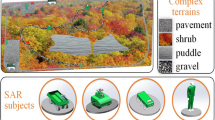Abstract
For architects of reinforcement learning (RL) agents in real-world applications, the design of a suitable training environment is challenging. Feature engineering and reward function design are mainly guided by human intuition and domain knowledge. We propose the application of a goal directed task analysis (GDTA) to structure knowledge about an application domain in order to guide the design of a RL agent embedded in a complex environment. Results from the task analysis can be leveraged for feature selection and reward function design. We showcase this approach in a human-autonomy-teaming application for military airborne operations.
Access this chapter
Tax calculation will be finalised at checkout
Purchases are for personal use only
Similar content being viewed by others
References
Amodei, D., Olah, C., Steinhardt, J., Christiano, P., Schulman, J., Mané, D.: Concrete Problems in AI Safety (2016)
Domingos, P.: A few useful things to know about machine learning. Commun. ACM 55, 78–87 (2012)
Khurana, U., Samulowitz, H., Turaga, D.: Feature engineering for predictive modeling using reinforcement learning. In: 32nd AAAI Conference on Artificial Intelligence, pp. 3407–3414 (2018)
Abbeel, P., Ng, A.Y.: Apprenticeship learning via inverse reinforcement learning. In: Proceedings, Twenty-First International Conference on Machine Learning, pp. 1–8 (2004)
Endsley, M., Bolte, B., Jones, D.: Designing for Situation Awareness. CRC Press, Boca Raton (2016)
Schulte, A., Donath, D., Lange, D.S.: Design patterns for human-cognitive agent teaming. In: International Conference on Engineering Psychology and Cognitive Ergonomics, pp. 231–243 (2016)
Connell, R., Lui, F., Jarvis, D., Watson, M.: The mapping of courses of action derived from cognitive work analysis to agent behaviours. In: Proceedings of Second International Joint Conference on Autonomous Agents and Multi Agent Systems, pp. 2–7 (2003)
Gangl, S., Lettl, B., Schulte, A.: Single-seat cockpit-based management of multiple UCAVs using on-board cognitive agents for coordination in manned-unmanned fighter missions. In: Conference on Engineering Psychology & Cognitive Ergonomics, pp. 115–124 (2013)
Lowe, R., Wu, Y., Tamar, A., Harb, J., Abbeel, P., Mordatch, I.: Multi-agent actor-critic for mixed cooperative-competitive environments. In: Advances in Neural Information Processing Systems, vol. 30 (2017)
Author information
Authors and Affiliations
Corresponding author
Editor information
Editors and Affiliations
Rights and permissions
Copyright information
© 2020 Springer Nature Switzerland AG
About this paper
Cite this paper
Schwerd, S., Lindner, S., Schulte, A. (2020). Goal Directed Design of Rewards and Training Features for Self-learning Agents in a Human-Autonomy-Teaming Environment. In: Ahram, T., Karwowski, W., Vergnano, A., Leali, F., Taiar, R. (eds) Intelligent Human Systems Integration 2020. IHSI 2020. Advances in Intelligent Systems and Computing, vol 1131. Springer, Cham. https://doi.org/10.1007/978-3-030-39512-4_141
Download citation
DOI: https://doi.org/10.1007/978-3-030-39512-4_141
Published:
Publisher Name: Springer, Cham
Print ISBN: 978-3-030-39511-7
Online ISBN: 978-3-030-39512-4
eBook Packages: Intelligent Technologies and RoboticsIntelligent Technologies and Robotics (R0)




